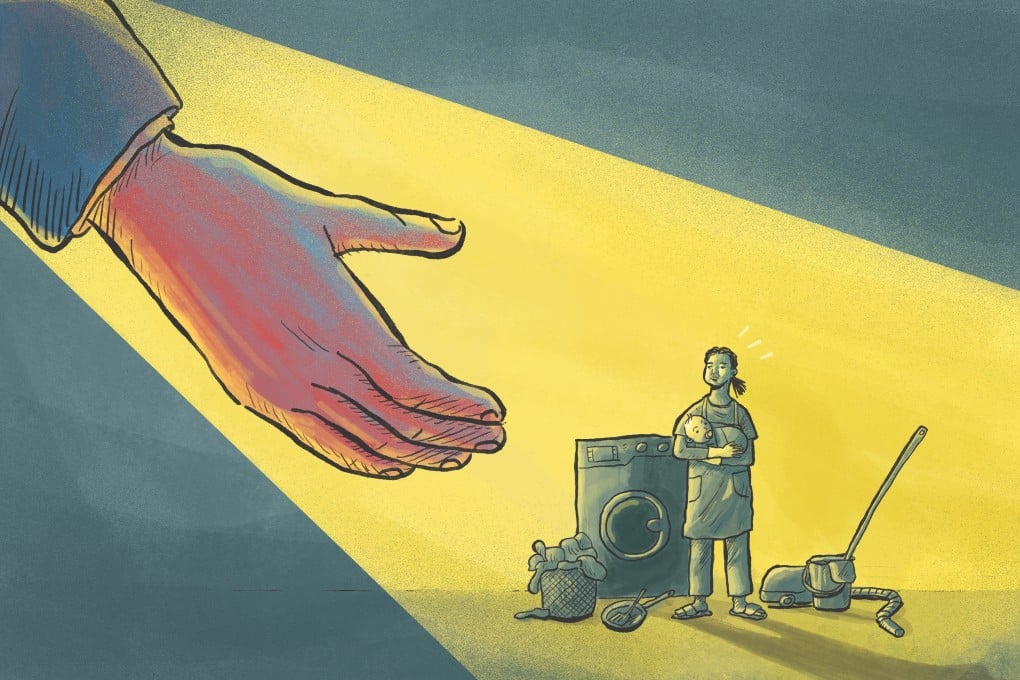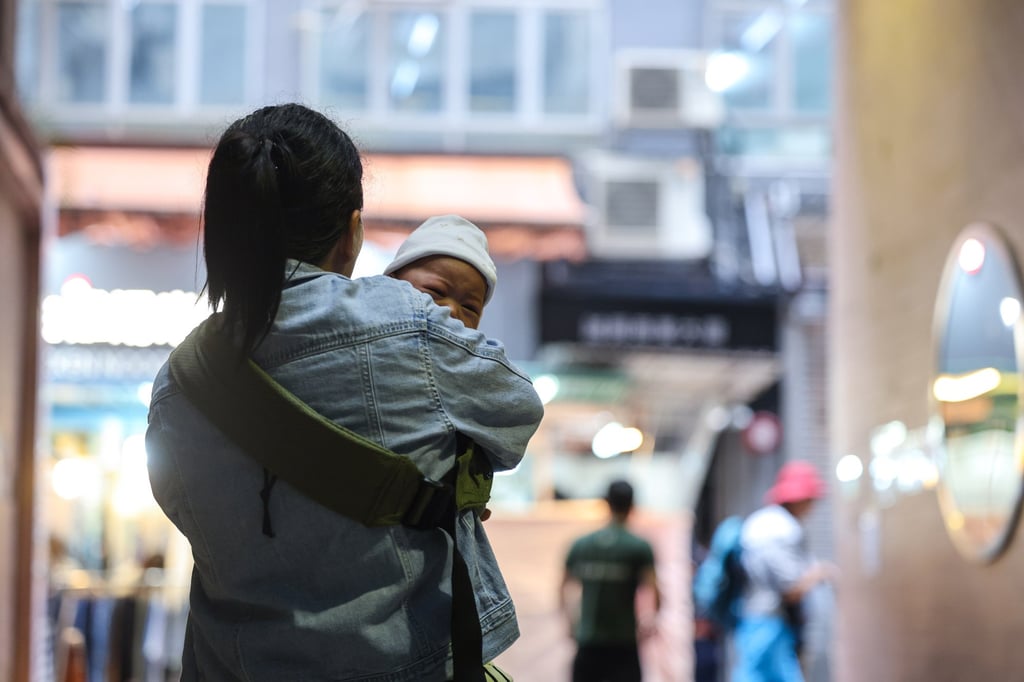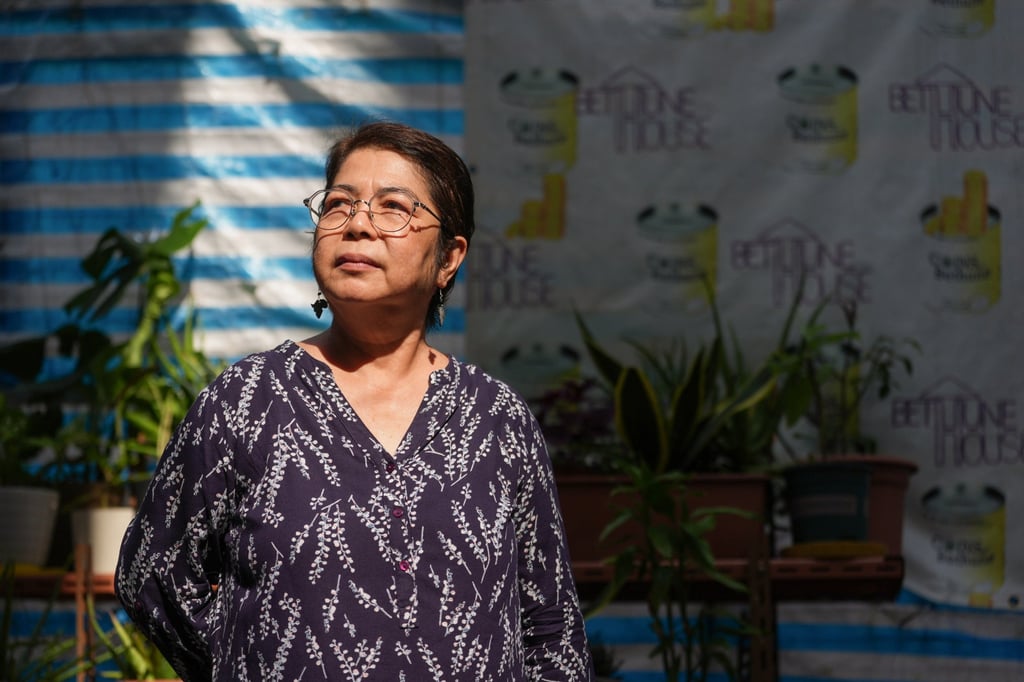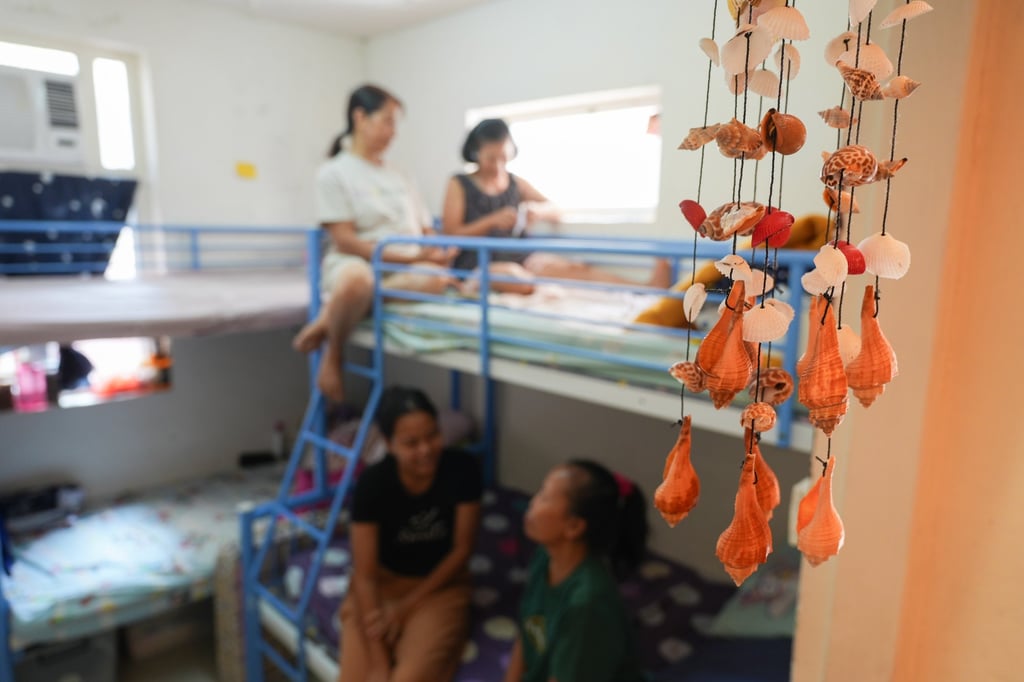- Joined
- Apr 14, 2011
- Messages
- 19,622
- Points
- 113
Samsters got up any maids raw?
Why you can trust SCMP
1
Listen
Further Reading
Discover MORE stories on
Foreign domestic workers in Hong Kong
now and stay updated with
related topics
Foreign domestic workers in Hong Kong
Hong Kong society | The Philippines | Indonesia | Hong Kong workers/labour rights | Jobs | Hong Kong economy | Focus | Hong Kong | Mainland China
discover more stories from
The Philippines
Browse other locations
China
Asia
North America
Middle East
Europe
Russia and Central Asia
Oceania
Africa
Americas and Caribbean
Before you go
scmp poll

Fiona Sun
Published: 8:30am, 6 Nov 2025Updated: 8:36am, 6 Nov 2025
At five months pregnant, domestic helper Daisy* was kicked out of her Hong Kong employer’s home one night without warning.
Distraught and alone, the 32-year-old called home in Mindanao, the Philippines, crying over what had happened to her.
“It was in the middle of the night. I felt so scared as I was pregnant and I had no family or friends here I could turn to,” Daisy recalled.
She had arrived in Hong Kong in 2023 to work for a local couple who had a seven-year-old son but fell pregnant last December after spending a holiday at home.
Daisy said her employer initially appeared not to mind her pregnancy, but things took a turn for the worse in May when the couple tried to force her to agree to terminate her contract, telling her that her condition would affect her housework.
After she refused to quit, she was told by her employer to pack her bags and leave their home in Causeway Bay immediately on May 27, she said.
Daisy’s plight was not that unusual among domestic workers in Hong Kong who became pregnant, according to unions, support groups and helpers, pointing to various difficulties the women faced.
Despite legal maternity protections, some pregnant helpers faced job loss, separation from their babies or resorted to illegal abortions due to insufficient information, they said.
The issue was thrust into the public spotlight in August when police arrested 11 helpers for allegedly selling illegal abortion pills or performing abortions unlawfully.
The case came to light on June 2, when officers received a report that a 39-year-old helper had collapsed in her employer’s home in Tin Shui Wai. Police said a fetus, about 35cm (13.8 inches) in length with no sign of life, was discovered in a laundry basket beside the helper’s bed.

Domestic helper Daisy and her baby boy Joel. Photo: Edmond So
Unions and groups called for better public education, support services and a shift in societal attitudes to protect the rights and well-being of the city’s about 368,000 domestic workers, mostly women from the Philippines and Indonesia.
“The majority of the migrant workers are young and at their reproductive age,” said Sringatin, secretary of the Indonesian Migrant Workers’ Union.
“There must be protection of migrant workers who have a baby or are pregnant in Hong Kong.”
They can access the city’s public healthcare and receive free prenatal and postnatal check-ups, and have their baby delivered in a public hospital with affordable fees.
Employers are not required to cover their helpers’ pregnancy-related expenses.
PathFinders, an NGO offering support and services to pregnant migrant workers and their children in Hong Kong, received 450 pregnancy-related inquiries from helpers as well as employers last year. The organisation offered direct support to 186 cases.
It received 410 inquiries in 2023 and 347 in 2022.
Stephanie Kwok Chi-ying, a senior case worker at the NGO, said some pregnant helpers chose to return to their home countries to give birth for reasons such as a more familiar support network and the company of their husbands.
There were also helpers who opted to give birth in Hong Kong before taking their babies back to their countries, she said.
“The biggest challenge is that they are afraid to tell their employers about their pregnancy because they fear being fired if they do so,” she said.
Kwok said that among the pregnant helpers her organisation had supported last year, 42 per cent of them lost their jobs, including being sacked or quitting, or having contracts expire.
Some helpers were dismissed when they returned to work after their maternity leave, she added.
Once dismissed, they were required to leave Hong Kong within two weeks, making it difficult for them to find a new employer, she added.

Stephanie Kwok says some employers are concerned about their liabilities. Photo: Sun Yeung
Keeping their pregnancy from employers also caused them not to be able to seek leave for free prenatal check-ups, which were offered on weekdays while most helpers only had their weekly day off on Sunday, she said.
Kwok said another major barrier was finding a place to accommodate their newborn babies if helpers chose to give birth in Hong Kong.
The live-in rule requires helpers to stay in the employer’s home. But most employers were unwilling to house their workers’ babies, she said.
“Some employers did not have a home big enough while others had concerns about their liabilities if anything happened to the children,” Kwok said.
“If there is really no other solution, the child may need to stay in hospital, which is not good with the newborn baby and the mother being disconnected that early.”
“The majority is not very supportive because in their mind, domestic workers really need to work,” union leader Sringatin said.
Edwina Antonio-Santoyo, executive director of Bethune House, which offers shelter to migrant women in Hong Kong, said the refuge took in about 10 pregnant helpers every year. Many of them needed a place to stay after they lost their jobs, she said.
“When their employer learned about their condition, the contracts were usually terminated,” she said.
In Hong Kong, it is illegal for an employer to dismiss an employee simply because she is pregnant. But Antonio-Santoyo said it was not easy for helpers to seek legal remedies, which could drag on for months.
“It’s hard, especially if the father of the baby is not here and waiting for them to return home,” she said.

Edwina Antonio-Santoyo is the executive director of Bethune House. Photo: Eugene Lee
A report released by PathFinders in September showed that some employers expressed stress and uncertainty about how they would handle a helper’s pregnancy, with one saying that it was “not the time and place” for a helper to get pregnant while working in Hong Kong.
Thomas Chan Tung-fung, chairman of the Hong Kong Union of Employment Agencies, said almost all employers would not hire pregnant helpers.
He said his agency also would not introduce pregnant helpers or those with childbearing plans to employers.
“Employers are concerned about pregnant helpers feeling physically unwell at home and are afraid of asking them to do household chores as usual,” he said.
Some helpers brought their babies to their employers’ homes and squeezed them into the same room where the employers’ children slept, he said, adding that caring for newborns also made them less focused on work.
Chan said in some cases, helpers and employers negotiated on the arrangements, with workers agreeing to terminate their contracts once pregnant and returning to work for the same household after giving birth.
But some did not know where they could seek an abortion legally, while some affordable procedures were only offered for pregnancies of up to 10 weeks, they said.
Both Kwok and Sringatin said a lack of information and knowledge about Hong Kong’s laws, maternity rights and services could lead some helpers to resort to illegal abortions.
Under the Offences against the Person Ordinance, any termination of pregnancy not performed by medical practitioners or not in a designated clinic or hospital is illegal.
Termination is only allowed within 24 weeks of pregnancy, unless it is absolutely necessary for saving the woman’s life.
Helpers, groups and experts called for more support and protection for domestic workers with childbearing needs.
They urged the government to step up public education to raise awareness of maternity rights among helpers and improve their access to related services by also offering them on Sundays, when most domestic workers had their day off.
Training for employers on how to handle helpers’ pregnancy should be made mandatory and offered by labour authorities, they said.
They also called for the live-in rule to be lifted to allow helpers to live out with their newborn babies.

Bethune House provides temporary shelter to domestic workers. Photo: Eugene Lee
Puja Kapai, an associate professor of the law faculty at the University of Hong Kong, said the city should bridge the educational gap and change the mindset towards helpers.
“There are attitudes which people believe helpers don’t have the right to get pregnant because they’re working and that this is part of their contractual obligation not to,” said Kapai, who is the convenor of the university’s Women’s Studies Research Centre.
She said transitional arrangements should be made available for helpers, including accommodation and care for their newborns in the city.
She suggested turning vacant buildings into temporary boarding facilities for helpers who gave birth and were in need, so they had a place to stay and support each other.
Being better informed and supported could also prevent helpers from resorting to illegal abortions, she said.
While expecting, she filed claims with labour authorities for her unpaid wages and maternity leave payments from her employer. The claims were settled after about two months.
She said the distress was overwhelming. It was her first time to give birth without family by her side in a foreign country. She cried many a night, had a mental breakdown and needed hospitalisation.
Daisy gave birth to a boy named Joel, her fourth child, on September 1.
She returned to the Philippines with Joel on October 29 to reunite with her husband, 37, and their two sons, aged nine and 12, and four-year-old daughter.
“I’ll spend more time with my family after all that happened,” she said. “Finally, I can be home.”
No place to call home: plight of Hong Kong’s pregnant domestic helpers
Support groups say helpers who become pregnant often face losing their jobs, separation from babies
Reading Time:6 minutesWhy you can trust SCMP
1
Listen
Further Reading
Pricey dental care, lack of options on Sundays leave Hong Kong helpers desperate
Hong Kong police arrest 11 domestic helpers in connection with illegal abortion
Hong Kong increases domestic helpers’ monthly minimum wage by 2.2% to HK$5,100
Discover MORE stories on
Foreign domestic workers in Hong Kong
now and stay updated with
Hong Kong steps up awareness of money laundering, scam risks for migrant workers
Filipino helpers found after search in Hong Kong fired, face being sent home
Letters |
related topics
Foreign domestic workers in Hong Kong
Hong Kong society | The Philippines | Indonesia | Hong Kong workers/labour rights | Jobs | Hong Kong economy | Focus | Hong Kong | Mainland China
discover more stories from
The Philippines
Video |
Typhoon Kalmaegi devastates Philippines as death toll tops 100
Browse other locations
China
Asia
North America
Middle East
Europe
Russia and Central Asia
Oceania
Africa
Americas and Caribbean
Before you go
scmp poll

Fiona Sun
Published: 8:30am, 6 Nov 2025Updated: 8:36am, 6 Nov 2025
At five months pregnant, domestic helper Daisy* was kicked out of her Hong Kong employer’s home one night without warning.
Distraught and alone, the 32-year-old called home in Mindanao, the Philippines, crying over what had happened to her.
“It was in the middle of the night. I felt so scared as I was pregnant and I had no family or friends here I could turn to,” Daisy recalled.
She had arrived in Hong Kong in 2023 to work for a local couple who had a seven-year-old son but fell pregnant last December after spending a holiday at home.
Daisy said her employer initially appeared not to mind her pregnancy, but things took a turn for the worse in May when the couple tried to force her to agree to terminate her contract, telling her that her condition would affect her housework.
After she refused to quit, she was told by her employer to pack her bags and leave their home in Causeway Bay immediately on May 27, she said.
Daisy’s plight was not that unusual among domestic workers in Hong Kong who became pregnant, according to unions, support groups and helpers, pointing to various difficulties the women faced.
Despite legal maternity protections, some pregnant helpers faced job loss, separation from their babies or resorted to illegal abortions due to insufficient information, they said.
The issue was thrust into the public spotlight in August when police arrested 11 helpers for allegedly selling illegal abortion pills or performing abortions unlawfully.
The case came to light on June 2, when officers received a report that a 39-year-old helper had collapsed in her employer’s home in Tin Shui Wai. Police said a fetus, about 35cm (13.8 inches) in length with no sign of life, was discovered in a laundry basket beside the helper’s bed.

Domestic helper Daisy and her baby boy Joel. Photo: Edmond So
Unions and groups called for better public education, support services and a shift in societal attitudes to protect the rights and well-being of the city’s about 368,000 domestic workers, mostly women from the Philippines and Indonesia.
“The majority of the migrant workers are young and at their reproductive age,” said Sringatin, secretary of the Indonesian Migrant Workers’ Union.
“There must be protection of migrant workers who have a baby or are pregnant in Hong Kong.”
Out of a job, separated from baby
Like other employees in Hong Kong, a domestic helper is eligible for 14 consecutive weeks of paid maternity leave if she has been employed for not less than 40 weeks immediately before the start of her maternity leave. Helpers who have worked fewer weeks are entitled to unpaid maternity leave of the same length.They can access the city’s public healthcare and receive free prenatal and postnatal check-ups, and have their baby delivered in a public hospital with affordable fees.
Employers are not required to cover their helpers’ pregnancy-related expenses.
PathFinders, an NGO offering support and services to pregnant migrant workers and their children in Hong Kong, received 450 pregnancy-related inquiries from helpers as well as employers last year. The organisation offered direct support to 186 cases.
It received 410 inquiries in 2023 and 347 in 2022.
Stephanie Kwok Chi-ying, a senior case worker at the NGO, said some pregnant helpers chose to return to their home countries to give birth for reasons such as a more familiar support network and the company of their husbands.
There were also helpers who opted to give birth in Hong Kong before taking their babies back to their countries, she said.
“The biggest challenge is that they are afraid to tell their employers about their pregnancy because they fear being fired if they do so,” she said.
Kwok said that among the pregnant helpers her organisation had supported last year, 42 per cent of them lost their jobs, including being sacked or quitting, or having contracts expire.
Some helpers were dismissed when they returned to work after their maternity leave, she added.
Once dismissed, they were required to leave Hong Kong within two weeks, making it difficult for them to find a new employer, she added.

Stephanie Kwok says some employers are concerned about their liabilities. Photo: Sun Yeung
Keeping their pregnancy from employers also caused them not to be able to seek leave for free prenatal check-ups, which were offered on weekdays while most helpers only had their weekly day off on Sunday, she said.
Kwok said another major barrier was finding a place to accommodate their newborn babies if helpers chose to give birth in Hong Kong.
The live-in rule requires helpers to stay in the employer’s home. But most employers were unwilling to house their workers’ babies, she said.
“Some employers did not have a home big enough while others had concerns about their liabilities if anything happened to the children,” Kwok said.
“If there is really no other solution, the child may need to stay in hospital, which is not good with the newborn baby and the mother being disconnected that early.”
‘Employers have concerns’
Some helpers and unions accused employers of being unhelpful to workers’ childbearing needs, ignoring their physical condition and dismissing them illegally.“The majority is not very supportive because in their mind, domestic workers really need to work,” union leader Sringatin said.
Edwina Antonio-Santoyo, executive director of Bethune House, which offers shelter to migrant women in Hong Kong, said the refuge took in about 10 pregnant helpers every year. Many of them needed a place to stay after they lost their jobs, she said.
“When their employer learned about their condition, the contracts were usually terminated,” she said.
In Hong Kong, it is illegal for an employer to dismiss an employee simply because she is pregnant. But Antonio-Santoyo said it was not easy for helpers to seek legal remedies, which could drag on for months.
“It’s hard, especially if the father of the baby is not here and waiting for them to return home,” she said.

Edwina Antonio-Santoyo is the executive director of Bethune House. Photo: Eugene Lee
A report released by PathFinders in September showed that some employers expressed stress and uncertainty about how they would handle a helper’s pregnancy, with one saying that it was “not the time and place” for a helper to get pregnant while working in Hong Kong.
Thomas Chan Tung-fung, chairman of the Hong Kong Union of Employment Agencies, said almost all employers would not hire pregnant helpers.
He said his agency also would not introduce pregnant helpers or those with childbearing plans to employers.
“Employers are concerned about pregnant helpers feeling physically unwell at home and are afraid of asking them to do household chores as usual,” he said.
Some helpers brought their babies to their employers’ homes and squeezed them into the same room where the employers’ children slept, he said, adding that caring for newborns also made them less focused on work.
Chan said in some cases, helpers and employers negotiated on the arrangements, with workers agreeing to terminate their contracts once pregnant and returning to work for the same household after giving birth.
More support urged
While working in Hong Kong, some helpers chose to terminate their pregnancies for various reasons, including financial difficulties or the inability to raise a child, according to support groups.But some did not know where they could seek an abortion legally, while some affordable procedures were only offered for pregnancies of up to 10 weeks, they said.
Both Kwok and Sringatin said a lack of information and knowledge about Hong Kong’s laws, maternity rights and services could lead some helpers to resort to illegal abortions.
Under the Offences against the Person Ordinance, any termination of pregnancy not performed by medical practitioners or not in a designated clinic or hospital is illegal.
Termination is only allowed within 24 weeks of pregnancy, unless it is absolutely necessary for saving the woman’s life.
Helpers, groups and experts called for more support and protection for domestic workers with childbearing needs.
They urged the government to step up public education to raise awareness of maternity rights among helpers and improve their access to related services by also offering them on Sundays, when most domestic workers had their day off.
Training for employers on how to handle helpers’ pregnancy should be made mandatory and offered by labour authorities, they said.
They also called for the live-in rule to be lifted to allow helpers to live out with their newborn babies.

Bethune House provides temporary shelter to domestic workers. Photo: Eugene Lee
Puja Kapai, an associate professor of the law faculty at the University of Hong Kong, said the city should bridge the educational gap and change the mindset towards helpers.
“There are attitudes which people believe helpers don’t have the right to get pregnant because they’re working and that this is part of their contractual obligation not to,” said Kapai, who is the convenor of the university’s Women’s Studies Research Centre.
She said transitional arrangements should be made available for helpers, including accommodation and care for their newborns in the city.
She suggested turning vacant buildings into temporary boarding facilities for helpers who gave birth and were in need, so they had a place to stay and support each other.
Being better informed and supported could also prevent helpers from resorting to illegal abortions, she said.
Returning home with baby
After being kicked out by her employer, domestic worker Daisy was helped by an NGO and moved into a shelter. She shared a room with about a dozen others sleeping on bunk beds and was offered food.While expecting, she filed claims with labour authorities for her unpaid wages and maternity leave payments from her employer. The claims were settled after about two months.
She said the distress was overwhelming. It was her first time to give birth without family by her side in a foreign country. She cried many a night, had a mental breakdown and needed hospitalisation.
Daisy gave birth to a boy named Joel, her fourth child, on September 1.
She returned to the Philippines with Joel on October 29 to reunite with her husband, 37, and their two sons, aged nine and 12, and four-year-old daughter.
“I’ll spend more time with my family after all that happened,” she said. “Finally, I can be home.”
